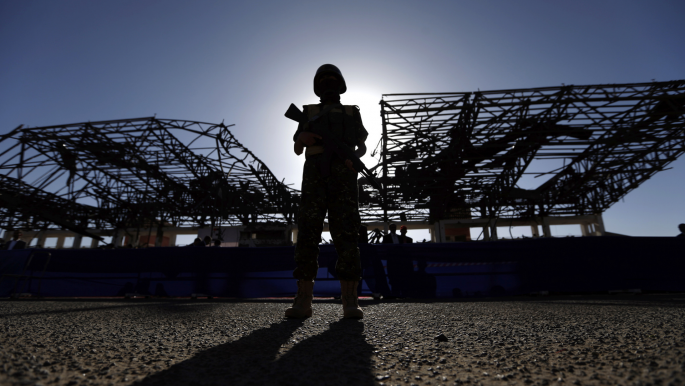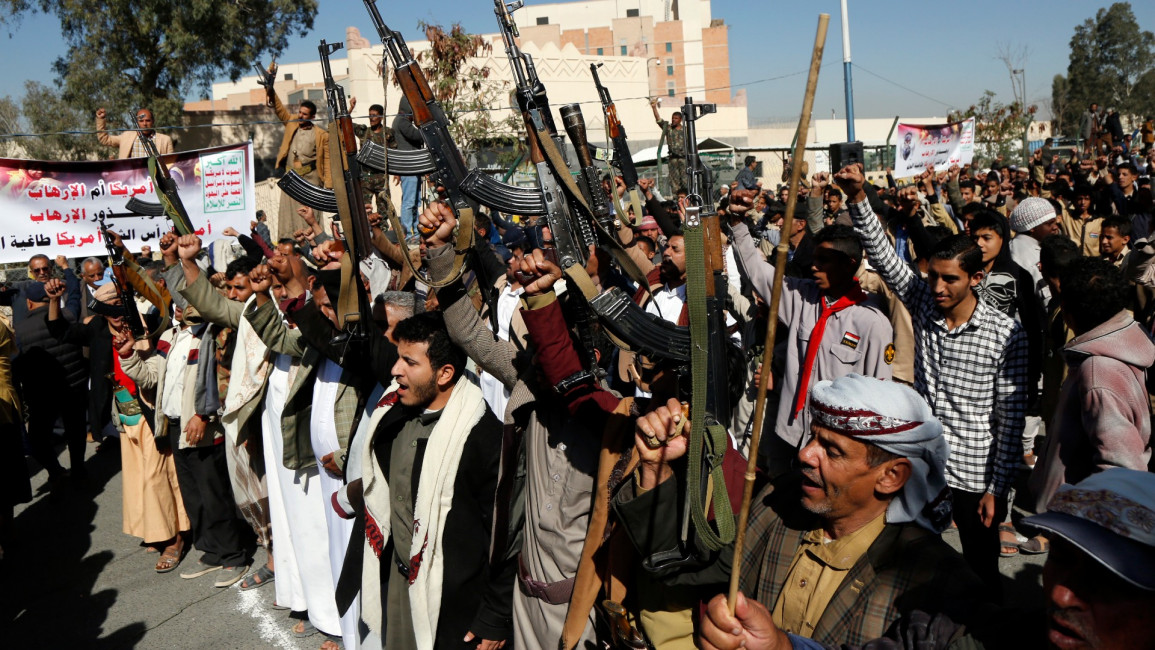Why Biden’s pledges to 'end' involvement in the Yemen war are not enough
The Biden administration also reversed the Iran-aligned Houthis' Foreign Terrorist Organisation (FTO) listing, which proponents argue could allow humanitarian aid to reach Yemeni civilians in Houthi territory.
However, amid concerns that Biden's pledges are mostly symbolic and not enough to alleviate Yemen's woes, many Yemeni-Americans who have worked tirelessly to combat Washington's involvement in the war feel more work needs to be done.
Jehan Hakim, Chair of the Yemeni Alliance Committee, told The New Arab that grassroots activism has been key in shifting the debate in favour of ending Washington's support for the Saudi-led atrocities in Yemen.
"This movement is growing and is now global. There is much more awareness over the last few years than what I remember seeing in 2015-2016 for example. We are seeing many more news outlets cover Yemen.
"We welcome Biden's statements about ending the role of the US in its support for the war on Yemen. But this administration is yet to clarify what this 'support' means, and what policies will be introduced to put change into action," added Hakim.
She added that a new War Powers Resolution from the Biden administration is crucial to fully end military support for the Saudi-led coalition.
"Until Yemen can finally be free from being bombed and starved, there is still too much work to do."
 |
Until Yemen can finally be free from being bombed and starved, there is still too much work to do |  |
Shireen al-Adeimi, assistant professor at Michigan State University, told The New Arab that this may set a new precedent and encourage Washington's allies to follow suit. Particularly after Italy on January 29 announced it would end arms sales to Saudi Arabia and the United Arab Emirates.
 |
|
| Read also: Yemen in Focus: Could US terror designation be used to leverage Houthis? |
She added that Canada will face more pressure to curtail its support for both countries.
The UK is also facing further domestic pressure to end its vast arms sales to Saudi Arabia and the UAE following Biden's announcement.
But British government officials have described Biden's decision as merely "a matter for the US government."
On the other hand, Biden has also shown sympathy towards Saudi Arabia's narratives over Yemen, showing he is keen to uphold Washington's partnership with Riyadh.
"Saudi Arabia faces missile attacks and other attacks from Iranian supplied forces in multiple countries. We're going to help Saudi Arabia to defend its territory and its people," said Biden, suggesting that he will continue backing the coalition.
Meanwhile, Saudi Deputy Defence Minister Khalid bin Salman said last Friday that Riyadh will keep providing political and military support to the Hadi government to counter the Houthi militias, Anadolu Agency reported.
"Biden is still using Obama-era language to justify involvement in supporting Saudi Arabia," said Shireen al-Adeimi. "Under the pretence of defence, there could be more future military support."
 |
Biden is still using Obama-era language to justify involvement in supporting Saudi Arabia... Under the pretence of defence, there could be more future military support |  |
She added that Biden may simply be seeking to appease growing criticism of Washington's involvement in the war, and that he would likely not have ended support without such pressure.
Furthermore, because US military involvement was perceived as "Trump's war," this could be Biden's attempts to distance himself as an "anti-Trump" figure, said Al-Adeimi.
"Despite this public façade, Biden could still make back-door military agreements with Saudi Arabia, despite his current pledges, especially if attention towards Washington's role in the war wanes," said Al-Adeimi.
Another risk is the lax focus on the UAE's role, as Abu Dhabi has supported the separatist Southern Transitional Council (STC), helped it take over the island of Socotra last June, and backed militias responsible for torture in secret prisons across the south.
Though the Biden administration said it would review the Trump-sanctioned package of F-35 fighter jets, armed drones and other defence equipment to Abu Dhabi, the Emirati Ambassador to Washington Yousef al-Otaiba said last week he is confident that the deal would still proceed.
Al-Adeimi said that the UAE's proactive PR campaign could still grant it a free pass from Washington's pressure, and should Biden be relaxed about pressuring the UAE, this could allow Abu Dhabi more freedom to empower the STC which could prolong instability in Yemen.
There is also the issue of the Saudi-imposed blockade on Yemen since 2017, which has restricted vital aid deliveries into the war-torn country and further crushed its economy. Al-Adeimi said that the US may be supporting the blockade, though the details of this are not clear.
"Biden has not said anything related to the blockade that has devastated the economy. He needs to address that," Aisha Jumaan, President of the Washington-based charity Yemen Relief and Reconstruction Foundation, told The New Arab.
"We need commercial imports and exports to be unhindered to allow business to recover and start hiring people. A country of 30 million people cannot live on aid alone."
 |
A country of 30 million people cannot live on aid alone |  |
Jumaan also stressed the need to fully reopen the capital Sanaa's airport and all other ports of entry, allow ships to pass through the Hodeida port after they receive UN certificates rather than have them diverted to Jeddah port.
She added that economic support and pressuring those countries responsible for Yemen's destruction pay their share in the country's reconstruction is crucial.
The UN last September said Saudi Arabia and the UAE neglected their promises to provide aid to Yemen, as the country edged closer towards famine.
 |
|
| Read also: With Yemen on the precipice, 'unity' is the only path to survival |
There have also been minimal efforts to establish a stable political solution, even if Saudi Arabia is pushed to end its military campaign.
Saudi Arabia and the UAE have tried to merge the Hadi government and STC into a fragile power-sharing administration, as an uneasy compromise for their geopolitical differences and backing of these rival factions. It shows Yemen's future is being dictated by the external powers responsible for its destruction.
Furthermore, Shireen al-Adeimi said that the US seeks a Washington-friendly government in Yemen, to secure its control over the strategic Bab el-Mandeb strait connecting the Red Sea and Gulf of Aden.
According to some estimates, seven percent of global trade and 30 percent of the world's oil passes through the Bab el-Mandeb Strait.
Should Washington continue prioritising its geostrategic aims, this could see it upholding its partnership with Saudi Arabia to securing an ideal government in Yemen.
While the decision to reverse the Houthis' FTO designation has reduced fears that further vital aid could be cut off to Yemenis, others believe it will bolster the Houthis and give them a free pass to consolidate power in north Yemen.
Nadwa al-Dawsari, a Yemen analyst who criticised the decision, tweeted: "The expectation is that Houthis will reciprocate & engage in peace talks in good faith. But that is not how Houthis will interpret this," adding that more leverage should be imposed on the faction.
Furthermore, amid the Houthis' ongoing campaign to capture the Marib governorate, Yemeni journalist Ali Al Sakani tweeted: "Was Biden admin's decision to revoke Houthis' designation as FTO a green light for Houthis to resume their large-scale offensive against Marib?"
Highlighting the urgency for support for a last peace solution, Ahmad Algohbary, a Yemen-based peace activist, told The New Arab: "Yemen is still suffering, it has been six years of bloody economic war.
"We need Biden's administration to help gather Yemeni parties on one table and find a peaceful solution. Even if he stops more arms sales, there will be no real peace without this.
"Many Yemenis currently have little hope that the US' current steps will end the war otherwise," added Algohbary, showing the need for more decisive action from the Biden administration.
Al-Adeimi also said there should be a new War Powers Resolution to ensure that there is no intelligence sharing and that military support to Saudi Arabia and the UAE truly ends.
Jonathan Fenton-Harvey is a journalist and researcher who focuses on conflict, geopolitics and humanitarian issues in the Middle East and North Africa
Follow him on Twitter: @jfentonharvey



